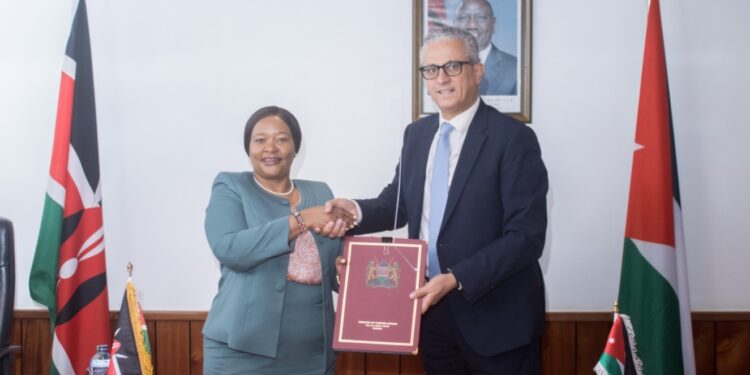Kenya has signed a tourism cooperation agreement with the Hashemite Kingdom of Jordan aimed at expanding bilateral tourism flows and unlocking economic opportunities in both nations. The memorandum of understanding, signed in Nairobi, seeks to strengthen collaboration in areas such as marketing, product diversification, and cultural exchange, with the overarching goal of increasing tourist arrivals to five million annually by 2027.
The signing, presided over by Kenya’s Cabinet Secretary for Tourism and Wildlife Rebecca Miano, is a landmark in Kenya’s strategic efforts to position tourism as a core driver of economic growth. Beyond formal diplomacy, the agreement is a practical framework for both countries to leverage tourism for mutual benefit—through employment creation, foreign exchange earnings, and community empowerment.
Cabinet Secretary Miano emphasized that the tourism sector continues to register impressive growth, noting strong performance in 2024 and early 2025. She reiterated that tourism is not only economically vital but socially transformative, directly affecting lives across the country. Miano described it as one of the most accessible and impactful sectors under the government’s Bottom-up Economic Transformation Agenda (BETA).
“We recognize the importance of tourism not just as a source of foreign exchange, but as a sector that creates jobs and directly impacts people’s lives,” she said, highlighting that growing tourist numbers can translate into increased earnings and better livelihoods, especially in underrepresented regions.
Jordan’s tourism model offers valuable lessons. With a population of 11 million, Jordan receives approximately six million tourists annually—a 2:1 ratio that has become a benchmark for Kenya. In contrast, Kenya, with a population of nearly 55 million, currently welcomes 2.4 million visitors each year. The government now aims to double this figure to at least five million tourists per year by 2027.
The memorandum is expected to facilitate mutual learning, knowledge transfer, and technical cooperation. Jordan’s diversified tourism offerings—ranging from religious and historical tourism to medical and leisure travel—demonstrate how a multifaceted approach can sustain high visitor numbers. Kenya is now preparing to emulate that success by expanding its tourism product portfolio to include more community-based tourism, wellness tourism, and cultural heritage experiences.
Ambassador Firas Khouri of the Hashemite Kingdom of Jordan, present at the signing, described the event as a proud moment that marked the culmination of years of diplomatic groundwork. He pointed to Jordan’s iconic religious and historical sites, including the Jordan River and Mount Nebo, and emphasized the country’s readiness to share its experience across multiple tourism segments.
“Tourism contributes nearly 50 per cent to Jordan’s GDP. This MOU will allow Jordan and Kenya to pioneer stronger relations in East Africa and the Middle East, regardless of global challenges,” Ambassador Khouri stated.
The emphasis on South-South cooperation reflects a broader shift in international tourism dynamics. Both countries recognize that collaboration within the global South offers new pathways for development—independent of traditional tourism source markets. With strategic coordination, they can jointly position themselves as hubs for diversified, experience-rich tourism that appeals to regional and international visitors alike.
Ambassador Joseph Masila, Deputy Director at the Directorate of the Ministry of Foreign and Diaspora Affairs, noted that Kenya and Jordan have enjoyed formal diplomatic ties since 1964. While Kenya does not yet have an embassy in Jordan, a consul operates in the country and plays a key role in promoting bilateral initiatives such as this one. Masila highlighted that the agreement would deepen people-to-people connections and broaden cultural awareness between the two countries.
Senior government representatives, along with officials from the State Departments of Tourism and Wildlife, also attended the event—signaling unified government support for the tourism sector’s expansion. The involvement of semi-autonomous government agencies in tourism policy and product development underscores the comprehensive approach being pursued.
The Kenya-Jordan tourism pact is more than an agreement on paper. It represents a new vision for growth rooted in knowledge exchange, regional solidarity, and the belief that tourism can be a powerful engine for national transformation. By tapping into new strategies and expanding partnerships, Kenya is not only setting a target of five million tourists annually—it is building the foundation to make that ambition a reality.
Dr. Omollo: Leather Park to Create Over 100,000 Jobs, Cementing Kenya’s Global Industrial Role The administration of President William Ruto has demonstrated unwavering commitment to delivering transformative development...
Read moreDetails









